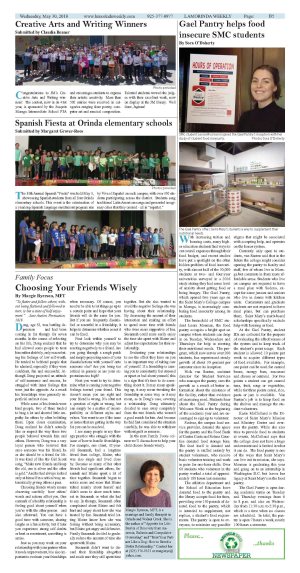| | Published May 30th, 2018
| Family Focus
| | Choosing Your Friends Wisely | | By Margie Ryerson, MFT |  | | Margie Ryerson, MFT, is a marriage and family therapist in Orinda and Walnut Creek. She is the author of "Appetite for Life: Stories of Recovery from Anorexia, Bulimia and Compulsive Overeating" and "Treat Your Partner Like a Dog: How to Breed a Better Relationship." Contact her at (925) 376-9323 or margierye@yahoo.com. |
"To flatter and follow others, without being flattered and followed in turn, is but a state of half enjoyment." - Jane Austen, Persuasion, 1818
 Doug, age 52, was battling depression and had been coming in for therapy for seven months. In the course of reflecting on his life, Doug realized that he had allowed some people to treat him rather shabbily, only exacerbating his feelings of low self-worth. He tended to befriend people that he admired, especially if they were confident, fun and successful. Although Doug projected an attitude of self-assurance and success, he struggled with inner feelings that were just the opposite. As a result his friendships were generally superficial and not close.
Doug, age 52, was battling depression and had been coming in for therapy for seven months. In the course of reflecting on his life, Doug realized that he had allowed some people to treat him rather shabbily, only exacerbating his feelings of low self-worth. He tended to befriend people that he admired, especially if they were confident, fun and successful. Although Doug projected an attitude of self-assurance and success, he struggled with inner feelings that were just the opposite. As a result his friendships were generally superficial and not close.
 While some of his friends were kind people, two of them tended to brag a lot and showed little empathy for others by often belittling them. Upon closer examination, Doug realized he didn't actually like or respect the way these two people behaved towards him and others. However, Doug was a very loyal person who believed that once someone was his friend, he or she should be a friend for life. It was kind of like the Girl Scout song, "Make new friends and keep the old, one is silver and the other is gold." And he had always looked only at himself in a critical way, automatically giving others a pass.
While some of his friends were kind people, two of them tended to brag a lot and showed little empathy for others by often belittling them. Upon closer examination, Doug realized he didn't actually like or respect the way these two people behaved towards him and others. However, Doug was a very loyal person who believed that once someone was his friend, he or she should be a friend for life. It was kind of like the Girl Scout song, "Make new friends and keep the old, one is silver and the other is gold." And he had always looked only at himself in a critical way, automatically giving others a pass.
 Choosing friends wisely means observing carefully how others' words and actions affect you. One earmark of a healthy relationship is feeling good about yourself when you're with the other person - and also afterward. You can have a good time with someone, sharing laughs or a fun activity, but if later you experience strong self-doubts or hurt or resentment, something is amiss.
Choosing friends wisely means observing carefully how others' words and actions affect you. One earmark of a healthy relationship is feeling good about yourself when you're with the other person - and also afterward. You can have a good time with someone, sharing laughs or a fun activity, but if later you experience strong self-doubts or hurt or resentment, something is amiss.
 Just as you may work on your relationship with your partner when it needs improvement, it is also important to evaluate your friendships when necessary. Of course, you need to be able to let things go up to a certain point and hope that your friends will do the same for you. But if you are frequently dissatisfied or resentful in a friendship, it helps to determine whether or not it can be fixed.
Just as you may work on your relationship with your partner when it needs improvement, it is also important to evaluate your friendships when necessary. Of course, you need to be able to let things go up to a certain point and hope that your friends will do the same for you. But if you are frequently dissatisfied or resentful in a friendship, it helps to determine whether or not it can be fixed.
 First look within yourself to try to determine why you may be reacting negatively to a friend. Are you going through a rough patch and simply projecting some of your dissatisfactions with yourself onto someone else? Are you being too critical in general or are your expectations too high?
First look within yourself to try to determine why you may be reacting negatively to a friend. Are you going through a rough patch and simply projecting some of your dissatisfactions with yourself onto someone else? Are you being too critical in general or are your expectations too high?
 Next you want to try to determine what is causing your negative feelings toward your friend. This doesn't mean you are right and your friend is wrong. It's often not a question of right or wrong, but can simply be a matter of incompatibility or different styles and values. You want to see if the issue or issues that are getting in the way for you can be resolved.
Next you want to try to determine what is causing your negative feelings toward your friend. This doesn't mean you are right and your friend is wrong. It's often not a question of right or wrong, but can simply be a matter of incompatibility or different styles and values. You want to see if the issue or issues that are getting in the way for you can be resolved.
 I see many people in my therapy practice who struggle with the issue of how to handle friendships. For example, one client, 32-year-old Susannah, had a longtime friend from college, Blaine, who was also single and lived close by. Because so many of her other friends had significant others, Susannah and Blaine spent a lot of time together. Susannah began to notice more and more that Blaine talked mainly about herself and didn't seem to show much interest in Susannah or what she had to say. In therapy, Susannah often complained about Blaine and felt hurt and angry about how she was treated by her. Susannah tried letting Blaine know how she was feeling without being accusatory, but Blaine got angry and defensive. Finally Susannah decided to gradually reduce the amount of time she spent with Blaine.
I see many people in my therapy practice who struggle with the issue of how to handle friendships. For example, one client, 32-year-old Susannah, had a longtime friend from college, Blaine, who was also single and lived close by. Because so many of her other friends had significant others, Susannah and Blaine spent a lot of time together. Susannah began to notice more and more that Blaine talked mainly about herself and didn't seem to show much interest in Susannah or what she had to say. In therapy, Susannah often complained about Blaine and felt hurt and angry about how she was treated by her. Susannah tried letting Blaine know how she was feeling without being accusatory, but Blaine got angry and defensive. Finally Susannah decided to gradually reduce the amount of time she spent with Blaine.
 Susannah didn't want to discard their friendship altogether and made sure they still spent time together. But she also wanted to avoid the negative feelings she was having about their relationship. By decreasing the amount of their interaction and making an effort to spend more time with friends who were more supportive of her, Susannah could more easily enjoy the time she spent with Blaine and adjust her expectations for their relationship.
Susannah didn't want to discard their friendship altogether and made sure they still spent time together. But she also wanted to avoid the negative feelings she was having about their relationship. By decreasing the amount of their interaction and making an effort to spend more time with friends who were more supportive of her, Susannah could more easily enjoy the time she spent with Blaine and adjust her expectations for their relationship.
 Evaluating your relationships to see the effect they have on you is an important way of taking care of yourself. If a friendship is causing you to consistently feel stressed or upset or bad about yourself, this is a sign that it's time to do something about it. It may mean speaking up, it may mean tweaking the friendship in some way, or it may mean, as in Doug's case, severing a relationship. Doug ultimately decided to ease away completely from the two friends who weren't a good match for him. And because he had first considered the situation carefully, he was able to withdraw without guilt or remorse.
Evaluating your relationships to see the effect they have on you is an important way of taking care of yourself. If a friendship is causing you to consistently feel stressed or upset or bad about yourself, this is a sign that it's time to do something about it. It may mean speaking up, it may mean tweaking the friendship in some way, or it may mean, as in Doug's case, severing a relationship. Doug ultimately decided to ease away completely from the two friends who weren't a good match for him. And because he had first considered the situation carefully, he was able to withdraw without guilt or remorse.
 In the next Family Focus column we'll discuss how to help your child choose friends wisely.
In the next Family Focus column we'll discuss how to help your child choose friends wisely.


|
| | | | | | | | | | | | |



